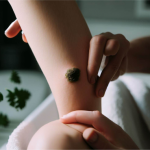Chronic hives, also known as chronic urticaria, is a skin condition that affects millions of people worldwide. It is characterized by the appearance of itchy, red welts on the skin that can last for weeks or even months.
Chronic hives can be a frustrating and uncomfortable condition that can impact daily life. In this article, we will explore what chronic hives are, their causes, symptoms, diagnosis, treatment options, natural remedies, and tips for preventing them.
What are Chronic Hives?
 Chronic hives are a skin condition that is characterized by the appearance of itchy, red welts on the skin that can last for weeks or even months. They are called chronic because they persist for more than six weeks. Hives are caused by an allergic reaction in the body that triggers the release of histamine, a chemical that causes inflammation and itching.
Chronic hives are a skin condition that is characterized by the appearance of itchy, red welts on the skin that can last for weeks or even months. They are called chronic because they persist for more than six weeks. Hives are caused by an allergic reaction in the body that triggers the release of histamine, a chemical that causes inflammation and itching.
There are two types of chronic hives: autoimmune and idiopathic. Autoimmune hives occur when the immune system attacks healthy cells in the body, causing an allergic reaction. Idiopathic hives have no known cause and are often referred to as chronic spontaneous urticaria.
Causes of Chronic Hives
There are several causes of chronic hives, including allergies, stress, autoimmune disorders, infections, and medications.
Allergies: Allergic reactions to food, medication, insect bites or stings, or environmental factors such as pollen or pet dander can trigger chronic hives.
Stress: Emotional stress can trigger an allergic reaction in some people and cause chronic hives.
Autoimmune disorders: Autoimmune disorders such as lupus or thyroid disease can cause chronic hives.
Infections: Viral infections such as hepatitis or bacterial infections such as strep throat can cause chronic hives.
Medications: Certain medications such as antibiotics or nonsteroidal anti-inflammatory drugs (NSAIDs) can cause chronic hives.
Symptoms of Chronic Hives
The main symptom of chronic hives is the appearance of itchy, red welts on the skin that can last for weeks or even months. Other symptoms may include swelling, burning or stinging sensation, and a feeling of warmth in the affected area.
Diagnosing Chronic Hives
Diagnosing chronic hives involves a physical examination, medical history, allergy testing, and blood tests. During a physical examination, a doctor will look for the presence of hives on the skin. They will also ask about any recent changes in diet or medication.
Medical history is also important in diagnosing chronic hives. A doctor will ask about any previous allergic reactions or medical conditions that may be contributing to the condition.
Allergy testing may be done to determine if an allergic reaction is causing chronic hives. Blood tests may also be done to check for underlying medical conditions such as autoimmune disorders.
Treating Chronic Hives
Treatment for chronic hives involves managing symptoms and identifying and treating underlying causes. Antihistamines are often used to relieve itching and reduce inflammation. Corticosteroids may be prescribed for severe cases of chronic hives.
Immunosuppressants such as cyclosporine or methotrexate may be used to treat autoimmune-related chronic hives. Biologic drugs such as omalizumab may also be used to treat severe cases of chronic hives.
Natural Remedies for Chronic Hives
There are several natural remedies that can help relieve symptoms of chronic hives, including oatmeal baths, aloe vera, cold compresses, and vitamin D supplements.
Oatmeal baths can help soothe itchy skin and reduce inflammation. Aloe vera has anti-inflammatory properties that can help reduce redness and swelling. Cold compresses can help relieve itching and burning sensations. Vitamin D supplements may help reduce inflammation and boost the immune system.
Tips for Preventing Chronic Hives
Preventing chronic hives involves avoiding triggers, managing stress, maintaining a healthy diet, and staying hydrated. Avoiding triggers such as food or environmental factors that cause an allergic reaction can help prevent chronic hives. Managing stress through relaxation techniques such as yoga or meditation can also help prevent chronic hives.
Maintaining a healthy diet that is rich in fruits, vegetables, and whole grains can help boost the immune system and prevent chronic hives. Staying hydrated by drinking plenty of water can also help prevent chronic hives.
Chronic hives can be a frustrating and uncomfortable condition that can impact daily life. Treatment options for chronic hives include antihistamines, corticosteroids, immunosuppressants, and biologic drugs. Natural remedies such as oatmeal baths, aloe vera, cold compresses, and vitamin D supplements may also help relieve symptoms.
Preventing chronic hives involves avoiding triggers, managing stress, maintaining a healthy diet, and staying hydrated. If you are experiencing symptoms of chronic hives, it is important to seek medical attention to determine the underlying cause and receive appropriate treatment.









